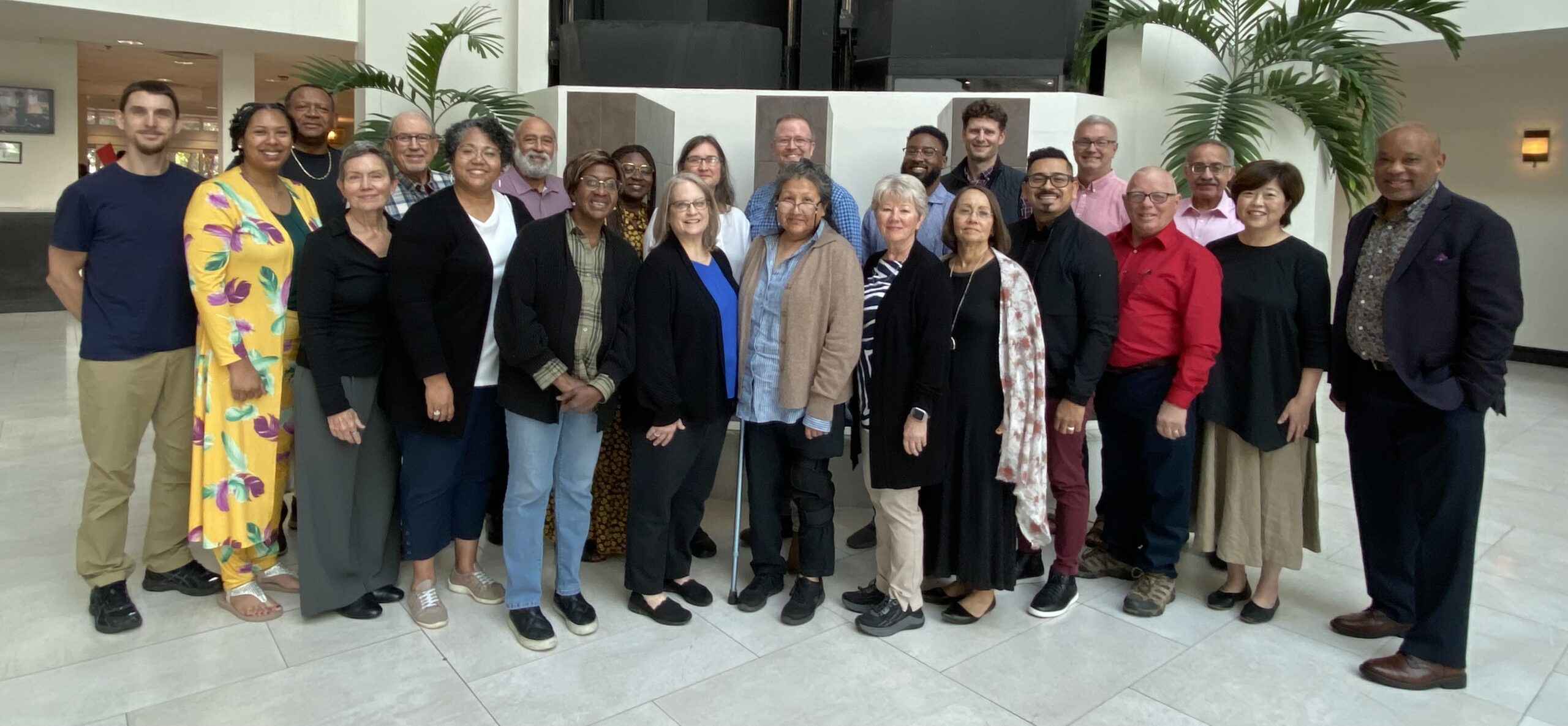
MC USA Executive Board, staff, agency leaders and the Racial Ethnic Council met in Destin, Florida, on Nov. 15, 2024. Front row: Todd Lehman, Lesley Francisco McClendon, Karen Lehman, Marisa Smucker, Helen Mfwilwakanda, Karen Zehr, Susan Hart, Linda Dibble, Marty Lehman, Sergio Nava, Phil Helmuth, Sue Park-Hur, Glen Guyton. Back row: Leslie Francisco, III, Mitch Kingsley, Juan Montes, Grace Pam, Rosetta Landis, Jon Carlson, Jerrell Williams, Thomas Dunn, Michael Danner and Richard Aguirre. Photo by Cami Dager.
Lea la versión en inglés aquí. At its meeting on Nov. 14-16, 2024, in Destin, Florida, the MC USA Executive Board affirmed a call from the denomination’s Racial Ethnic Council (REC) to increase awareness of the historical record of BIPOC Mennonites and to fund BIPOC contributions to the MC USA Archives. Executive Board members also discussed the responsibilities and objectives of a task group commissioned with reimagining MC USA’s structure and governance.
Racial Ethnic Council priorities
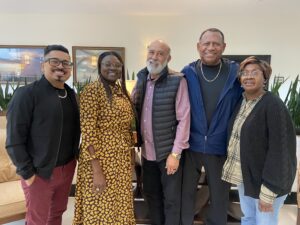
Racial Ethnic Council representatives: Sergio Nava, Grace Pam, Juan Montes, Leslie Francisco, III, and Helen Mfwilwakanda. Photo by Sue Park-Hur.
Members of the REC met with Executive Board members on the second day of the recent Executive Board meeting. The REC is a leadership body that connects the denomination’s distinct racial ethnic constituency groups and brings priorities to the Executive Board.
The REC members present were:
- Leslie Francisco, III, representing the African American Mennonite Association.
- Helen Mfwilwakanda and Grace Pam of the African, Belizean & Caribbean Mennonite Mission Association.
- Juan Montes and Sergio Nava of Iglesia Menonita Hispana.
Two Executive Board members also represent racial ethnic constituency groups: Executive Board member Lesley Francisco McClendon, represents the African American Mennonite Association, and Susan Hart, represents Native Mennonite Ministries.
MC USA Director of Racial/Ethnic Engagement Sue Park-Hur also attended the meeting.
The REC invited Felipe Hinojosa, Ph.D., to the meeting to equip and resource the Executive Board. Hinojosa is the John & Nancy Jackson endowed chair in Latin America and professor of History at Baylor University, Waco, Texas. He is also an award-winning author of several books on Latino American and Latino Mennonite history.
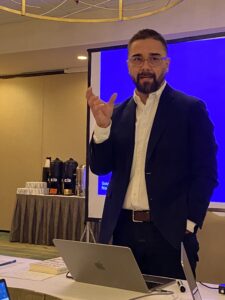
Felipe Hinojosa presents to the MC USA Executive Board. Photo by Cami Dager.
During his talk, Hinojosa focused on the history of the Mennonite Church through a Latino lens, while also highlighting the importance of understanding broader histories of the Caribbean, Indigenous, African American and Asian American communities. He led the Executive Board members and staff in an exercise to identify acts of racism against Latinos and resistance by Latinos against racism, emphasizing the importance of relational history and the need for churches to integrate diverse narratives.
“My calling to you today is that we get involved in the work of storytelling. To do that, we need help,” said Hinojosa. “MC USA has a great denominational archive in Elkhart, Indiana. The Archives should be central to how we tell this Mennonite story,” he added.
Hinojosa pointed out that only 5% of the MC USA Archives’ 8,000 linear feet of materials is devoted to stories of African American, Latino, Asian American or Native American Mennonites – and much of that is in the context of missionary stories.
“When [historians] go to the archive to find our stories, it is important that they hear it directly from us and not from the pen of a missionary,” he said. “There have been wonderful oral history programs in the Mennonite church in the past … We just have not done enough,” Hinojosa added.
On behalf of the REC, Hinojosa called Executive Board members, conferences and congregations to take a proactive role by:
- Exploring ways to record and preserve the oral histories of marginalized groups within MC USA.
- Incorporating the stories and cultural expressions of diverse communities into programming and worship at every level of the denomination.
- Supporting the MC USA Historical Archives financially, so that fragile records, such as audio recordings from the 1972 Cross-Cultural Youth Convention, can be digitized.
Park-Hur also encouraged Executive Board members to attend MC USA’s Hope for the Future celebration marking the 30th anniversary of the Damascus Road (now Roots of Justice) anti-racism process, Feb. 28-Mar. 2, 2025, in Goshen, Indiana. This year’s conference is open to all MC USA members – BIPOC and white allies.
“The second phase of the REC’s plan is to encourage BIPOC congregations to add archival records to the MC USA Archives,” Park-Hur said, noting that the REC will be recording oral histories for archival preservation at the Hope for the Future conference.
The Executive Board members expressed strong affirmation for the REC initiative.
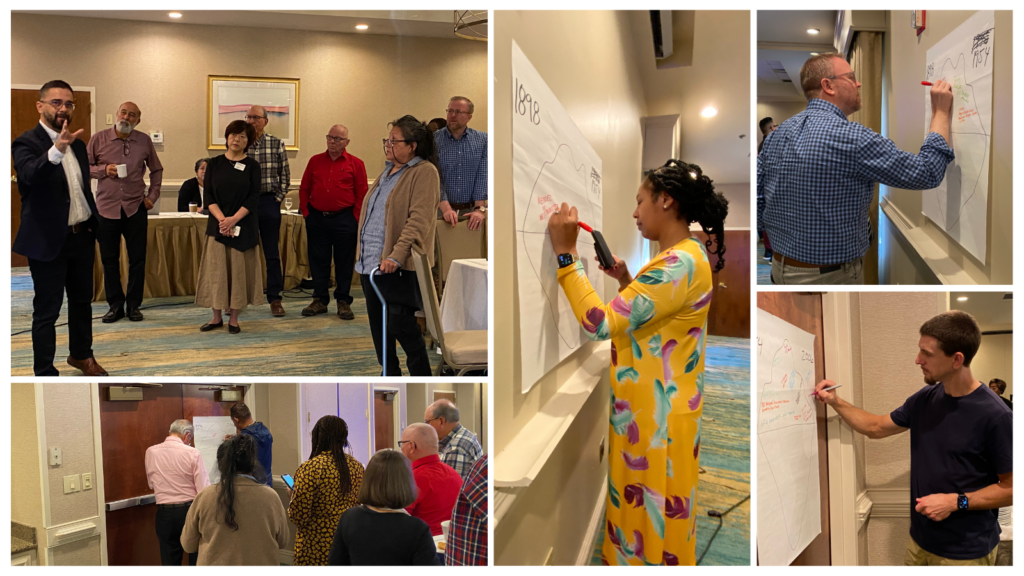
The MC USA Executive Board, staff and REC participate in an exercise to raise awareness of Latino history in the U.S.
Structure Review Task Group
The Executive Board also discussed a proposed structure review task group. According to the draft plan, the goal of the task group is “to reimagine a framework that maintains the interconnectedness between the church’s various entities and better responds to current and future needs.” The role of the task group is to “[review] and [propose] recommendations on how the national church’s structure, particularly around membership, funding model, and governance, can be optimized for greater transparency, effectiveness, and unity.”
Specific objectives will be to evaluate current structures, identify areas for better efficiency and communication, ensure that recommendations promote anti-racist and culturally competent principles and create a roadmap for transparent and inclusive decision making.
In the discussion that followed, Executive Board members acknowledged that the denomination has changed since its founding in 2001 and needs to reflect the current realities of who we are and aspire to be. Executive Board members also emphasized the need for transparency and clarity of communication related to the structural review, noting that this process is not about MC USA’s theology.
“We’re re-envisioning the systems by which we do our mission,” said Guyton. “We still hold the values that we put forth following the Future Church Summit – Follow Jesus, witness to God’s peace and experience transformation. This is not the opportunity to reexamine our values but to focus on how we effectively execute these things now and in the future,” he added.
Executive Director Report
In his report to the Executive Board, Guyton addressed what he described as the “critical financial situation” of the denomination. This year’s budget deficit has continued to grow, as MC USA agencies have had shortfalls in their anticipated “first fruits” contributions to the Executive Board. Agency first fruits are the primary source of funding for the MC USA Executive Board. Guyton also reviewed ways that the staff are addressing the situation through budget cuts, staffing adjustments and fundraising.
“We trust God – there’s always a ram in the bush,” said Guyton, referencing Genesis 22:13 when God provided a ram for Abraham. “We have some things in place, and we budget conservatively. My concern is that we will need to cut capacity,” he added.
Guyton noted that planning for the Follow Jesus ’25 convention and the Delegate Assembly is underway, with registration slated to open shortly.
Church Vitality Update
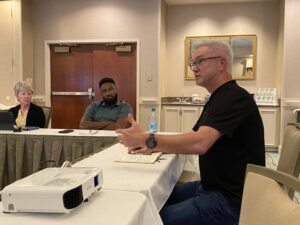
Michael Danner provides updates to the Executive Board. Photo by Cami Dager.
Michael Danner, associate executive director of Church Vitality, provided an update that highlighted growing engagement with MC USA’s Safe Church ministry. He noted that recent webinars have attracted pastors and leaders from across MC USA as well as from other denominations.
Danner also discussed the Prevention and Accountability project, which will be finalized after feedback from conference ministers and attorneys. This policy guide aims to standardize misconduct processes across area conferences. It is expected that the final document will be available for a preview at the 2025 Delegate Assembly.
Mennonite Education Agency Integration
Danner, who serves a dual role as executive director of Mennonite Education Agency (MEA), reported that MEA’s board of directors is continuing its discernment process regarding his recommendation (as executive director) to integrate MEA into the structure of MC USA.
Danner said he expects the MEA board to make a decision by the end of 2024.
MennoMedia Review
In accordance with MC USA bylaws, the Joint Executive Committee performed a review of MennoMedia, the publishing agency of MC USA and Mennonite Church Canada.
Guyton praised Executive Director Amy Gingerich’s leadership of the agency, citing her market prowess and her ability to lead the agency through a financial turnaround. In their written responses, the MennoMedia board also commended Gingerich as providing “strong strategic, creative and adaptive leadership.”
The review highlighted several significant market challenges, including the changing religious landscape, shrinking denominational market, declines in congregational size and Sunday school attendance, and the shift away from printed materials to digital content.
Areas of hope included increased donor support, innovative faith formation initiatives, growing partnerships with other Anabaptist groups and beyond, firm commitment to Anabaptist core convictions, efforts toward greater intercultural competency, increases in digital offerings, and strong denominational support for collaborative projects, such as Anabaptism at 500.
The Executive Board discussed the review, emphasizing the importance of maintaining a denominational publisher and affirming the value of its many resources, while also acknowledging that changes may be necessary to maintain MennoMedia’s sustainability.
In other business
The Executive Board reflected on ways to help congregations and conferences connect with each other while living out the commitments of the denomination’s 2014 Churchwide Statement on Immigration.”
The Executive Board is tentatively scheduled to meet on Saturday, Feb. 8, 2025, via Zoom.
Mennonite Church USA is an Anabaptist Christian denomination, founded in 2002 by the merger of the Mennonite Church and the General Conference Mennonite Church. Members of this historic peace church seek to follow Jesus by rejecting violence and resisting injustice. MC USA’s Renewed Commitments state the following shared commitments among its diverse body of believers: to follow Jesus, witness to God’s peace and experience the transformation of the Holy Spirit. Mennoniteusa.org
Written by Camille Dager.
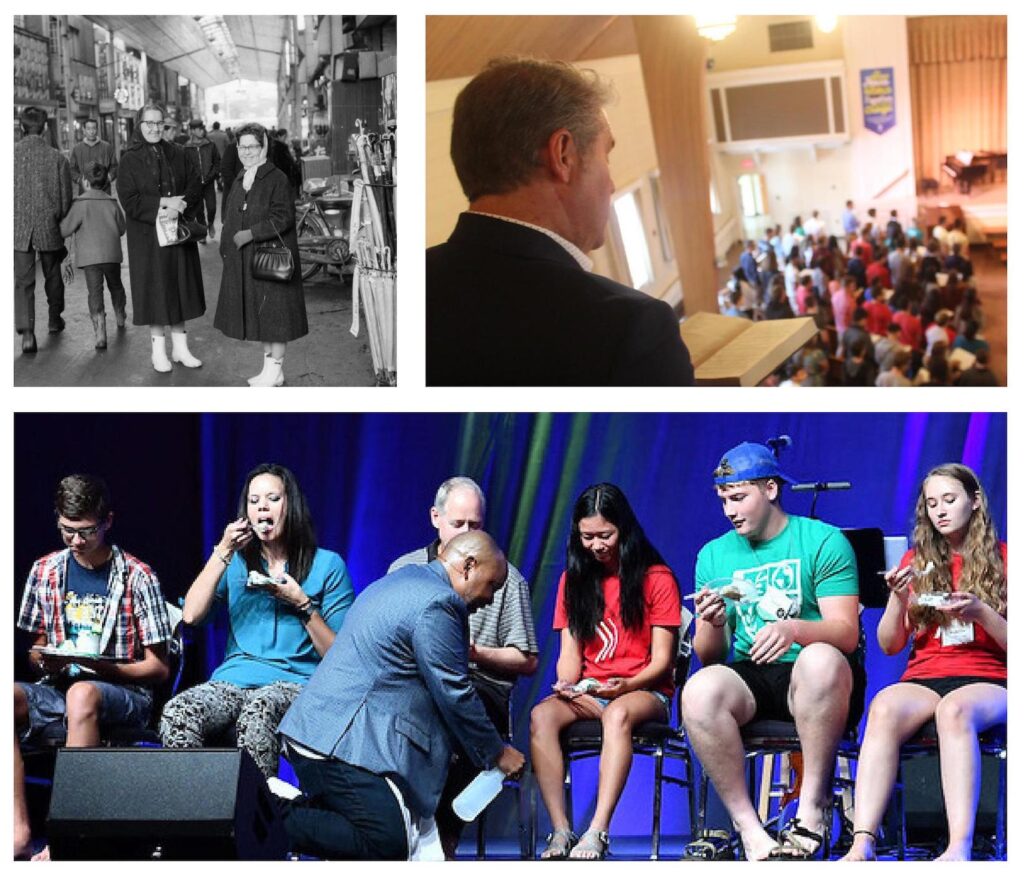 As members of Mennonite Church USA, let us Journey Forward together to provide relevant ministry in the 21st century and live into our Renewed Commitments to follow Jesus, witness to God’s peace and help our communities experience transformation. Please prayerfully consider a gift to our Annual Fund, which directs donations to where they are needed most, strengthening our denomination, which in turn, supports area conferences, congregations, and members.
As members of Mennonite Church USA, let us Journey Forward together to provide relevant ministry in the 21st century and live into our Renewed Commitments to follow Jesus, witness to God’s peace and help our communities experience transformation. Please prayerfully consider a gift to our Annual Fund, which directs donations to where they are needed most, strengthening our denomination, which in turn, supports area conferences, congregations, and members.

